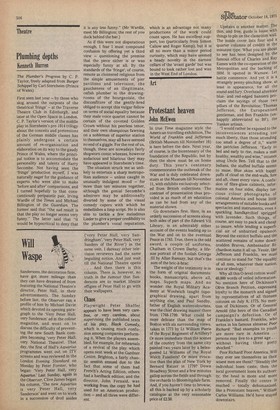Theatre
Plumbing depths
Kenneth Hurren
The Plumber's Progress by C. P. Taylor, freely adapted from Burger Schippel by Carl Sternheim (Prince of Wales) First seen last year — by those who slog around the outposts of the theatrical 'fringe' — at the Traverse Theatre Club in Edinburgh, and later at the Open Space in London, C. P. Taylor's version of the middle play in Sternheim's pre-1914 trilogy about the conceits and pretensions of the German middle classes has plainly undergone a certain amount of re-organisation and elaboration on its way to the gaudy Prince of Wales, where the principal notion is to accommodate the personality and talents of Harry Secombe. Not having seen the 'fringe' production myself, I was naturally eager for the guidance of experts who were able to make 'before and after' comparisons, and I turned hopefully to that conscientiously peripatetic pair, Irving Wardle of the Times and Michael Billington of the Guardian. The former said that "the sad result is that the play no longer seems very funny." The latter said that "it would be hypocritical to deny that
it is any less funny." (Mr Wardle, meet Mr Billington; the rest of you duck behind the bar.) As if this were not disputatious enough, I fear I must compound confusion by offering yet a third view — questioning the premise that the piece either is or was especially funny at all. By the standards of the 'fringe', of course, remote as cloistered religious from the simple amusements of pier pavilions and television, the gaucheness of an illegitimate, oafish plumber in the drawingrooms of the bourgeoisie, the discomfiture of the gently-bred obliged to accept this vulgar fellow on terms of social equality because their male voice quartet cannot be certain of the coveted Golden Crown without his peerless tenor, and their own obsequious fawning on a nobleman of superior station to themselves, may all have seemed no end of a giggle. For the rest of us, though, these are nowadays fairly shopworn comic wheezes, however audacious and hilarious they may have appeared in Sternheim's time.
The situation struck me as unlikely to entertain a sharp metropolitan audience — unless caught in unusually indulgent mood — for more than ten minutes together, although the genial Secombe's admirers may be additionally diverted by some of the visual comedy capers with which he embellishes a limp script. He is also able to tackle a few melodious Lieder to give a proper credibility to the plumber's vocal reputation, which is an advantage not many productions of the work could count upon. He has excellent support, too (particularly from Simon Callow and Roger Kemp), but it is all no more than a minor period curiosity, which may have seemed a heady novelty in the earnest cellars of the 'avant garde' but was bound to look rather lost and wan in the West End of London.


































 Previous page
Previous page